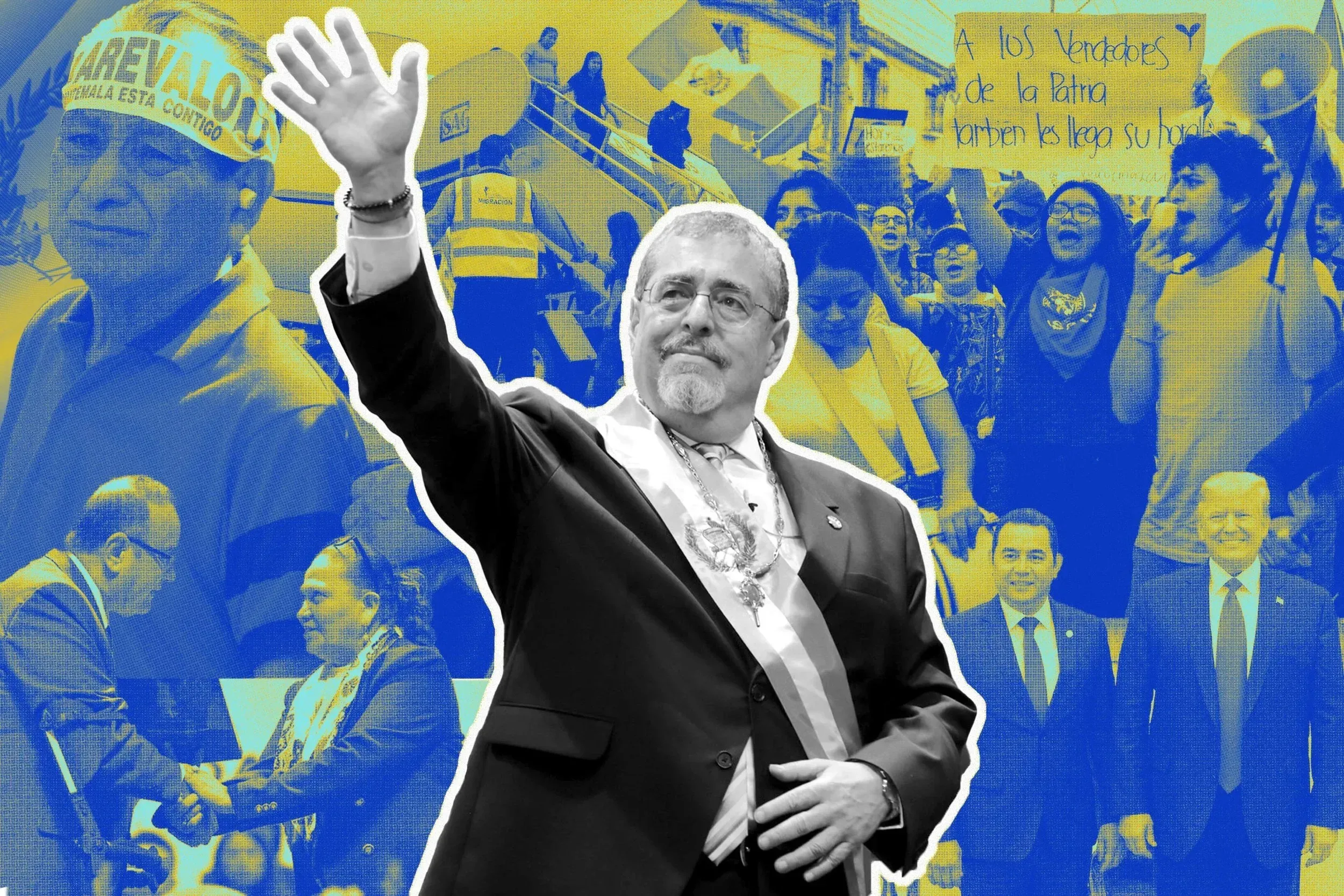
How a progressive president became an unlikely partner in Trump’s hardline immigration policy.
When Donald Trump returned to the White House in January, a tightly knit community of conservative politicians in Guatemala celebrated.
For years, they had lobbied hard, cultivating friends among right-leaning politicians and religious leaders from Guatemala City to Washington, D.C. They invested hope in hints that a return of Trump to the White House would end travel bans and economic sanctions imposed on many of them by the previous Biden administration because they had attempted to stop the 2024 inauguration of Guatemala’s President Bernardo Arévalo.
Arévalo’s victory had shocked Guatemala’s ruling class – a community of politicians, military officers, and religious leaders whose families long called the shots in the Central American nation. They had emerged largely intact after a decades-long civil war that claimed some 200,000 lives and helped push nearly half a million more poor Guatemalans onto the migrant trail to the U.S.

As a nonprofit journalism organization, we depend on your support to fund more than 170 reporting projects every year on critical global and local issues. Donate any amount today to become a Pulitzer Center Champion and receive exclusive benefits!
But Arévalo, the son of a former president who had championed workers' rights and social causes, won three-quarters of the vote in the fall of 2024, driven by support from Indigenous Guatemalans and young voters. For them, Arévalo’s election held the promise of justice and accountability for alleged crimes committed during the civil war.
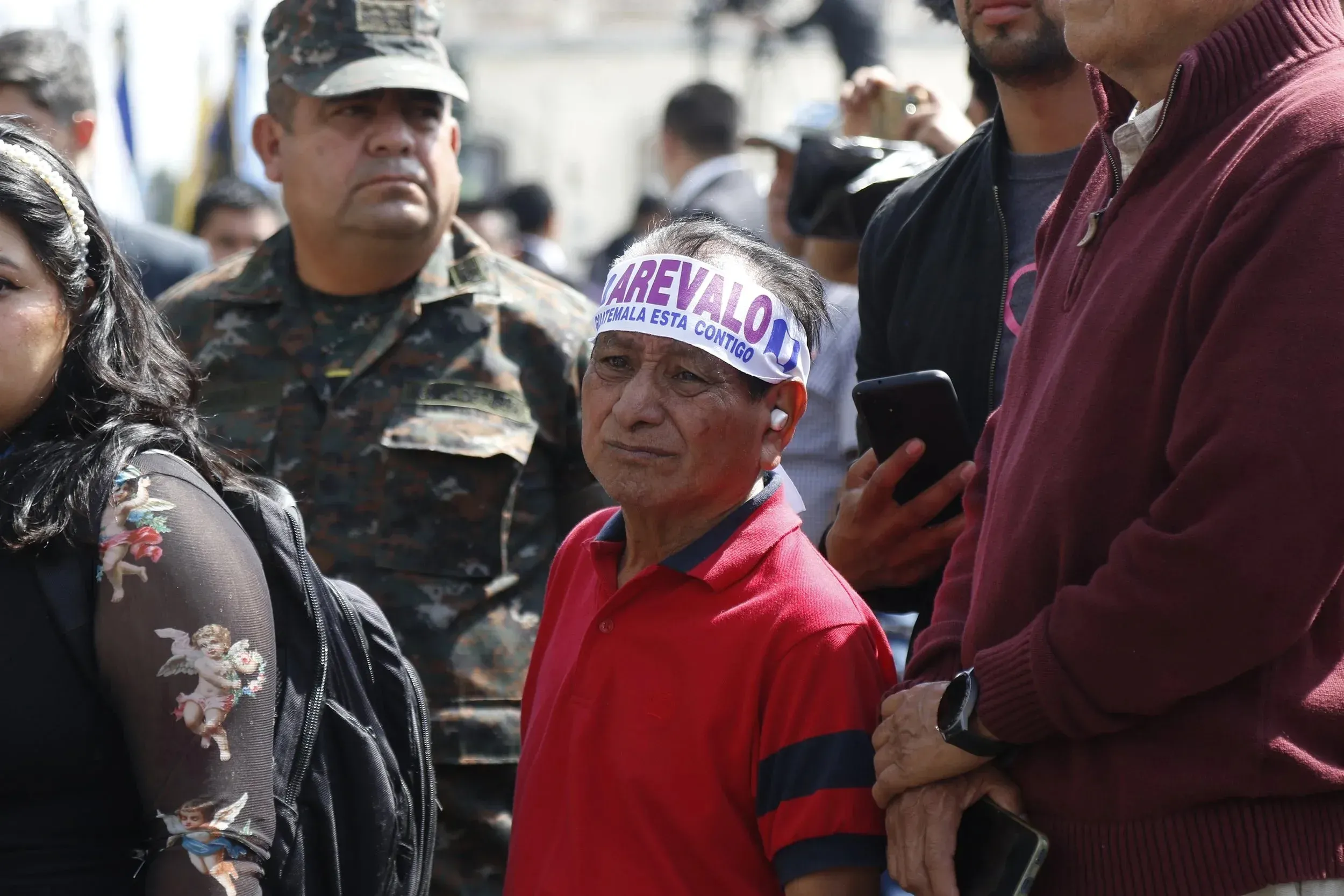
Immediately, however, Arevalo’s path was threatened by Guatemalan politicians and judges who conjured up restrictions on his political party. That was seen by the Biden administration as retaliation, prompting warnings – and then the sanctions. The European Community echoed the punishment.
“We knew we had to step in and challenge the conservative politicians in Guatemala,” a U.S. congressional adviser told palabra, explaining that the sanctions were the best way to help the Arévalo transition.
However, when Trump regained the U.S. presidency, Guatemala’s conservative elites expected swift rebukes for Arévalo. After all, they’d counted Trump’s new Secretary of State Marco Rubio as a reliable ally.
Yet since his election, Arévalo has demonstrated sharp diplomatic skills. He has developed a working relationship with Washington, D.C., and has remained on the Trump administration’s good side. Earlier this year, he welcomed Rubio and established Guatemala’s willingness to accept flights full of deported migrants, including many non-Guatemalans. Arévalo’s government will now welcome home deported Guatemalans with U.S. financing, and it will ship other migrants to their countries of origin. Arévalo also announced plans to create a new police unit that will patrol the borders Guatemala shares with Honduras and El Salvador and impede flows of would-be migrants.
At the start of this turnabout, Rubio’s speech and declarations to the Guatemalan media shocked conservatives: He did not mention lifting the travel visa restrictions they had hoped for. Instead, he emphasized that the U.S. cannot maintain strong political or economic relations with a country where a coup d’état could occur.
“I have rarely seen someone lose their dignity as displayed by the right in Guatemala,” adding that with Rubio's visit, U.S. policy was only protecting its interests, hardline pundit Ricardo Méndez Ruiz said in a post on X that was quoted by the Guatemalan daily La Hora. In Guatemala, Méndez Ruiz leads the Fundación Contra el Terrorismo (Foundation Against Terrorism) — which advocates for shielding retired military officials from prosecution.
Washington’s unexpected new view of Guatemala underscores an uncertainty that now dominates the country’s politics. It’s promising for the Arévalo government to be the new ally in Trump’s ambitious plan to deport millions of undocumented migrants from the United States. But a strong campaign by ultra-right conservatives continues to block efforts to hold military officers and politicians accountable for atrocities committed during the bloody civil war.
Former U.S. Ambassador Stephen McFarland, who served in Guatemala from 2008 to 2011, said the Rubio visit showed, at least for now, that the Trump administration seems to trust Arévalo. But McFarland warned in an interview with palabra that the coming months will remain tense for Arévalo and his government: His political opponents have not given up.
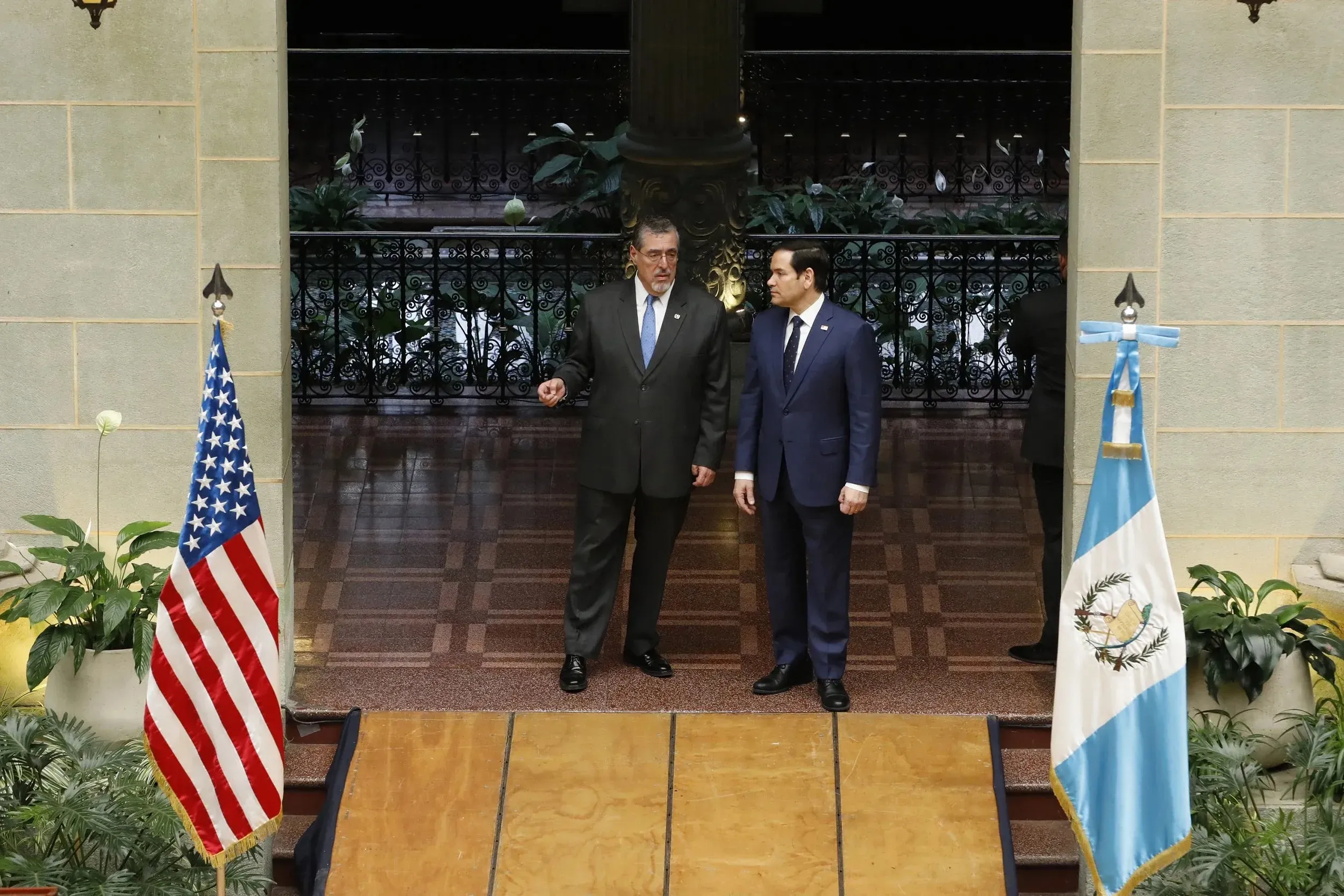
They banked on Rubio
As one of Florida’s Republican senators, Marco Rubio once led a well-financed campaign by conservative U.S. politicians against Guatemala’s International Commission Against Impunity (CICIG in Spanish), an organization launched in 2007 by the United Nations to help disband criminal groups left over from the Guatemalan civil war and to strengthen Guatemala’s legal infrastructure.
Guatemala remains sharply divided over the lasting impact of a more than 30-year-long civil war that claimed over 200,000 lives, largely among the nation’s vast Indigenous population. The conflict ended in 1996 with a United Nations-brokered peace accord that held the military responsible for 93 percent of the killings during the conflict. Despite that trial, the nation’s elite and the military have largely insulated themselves against prosecution for civil war crimes.
Arévalo has not been able to dismiss the nation’s attorney general, Consuelo Porras, a pro-military official who has rejected many of Arévalo's political edicts. She was appointed by his predecessor, Jimmy Morales, and has a legal lock on her term until next year. Porras is aligned with anti-Arévalo forces in the Guatemalan Congress and the judiciary. As such, observers, like analysts at the Cyrus R. Vance Center for International Justice at Stanford University, believe the attorney general is untouchable.
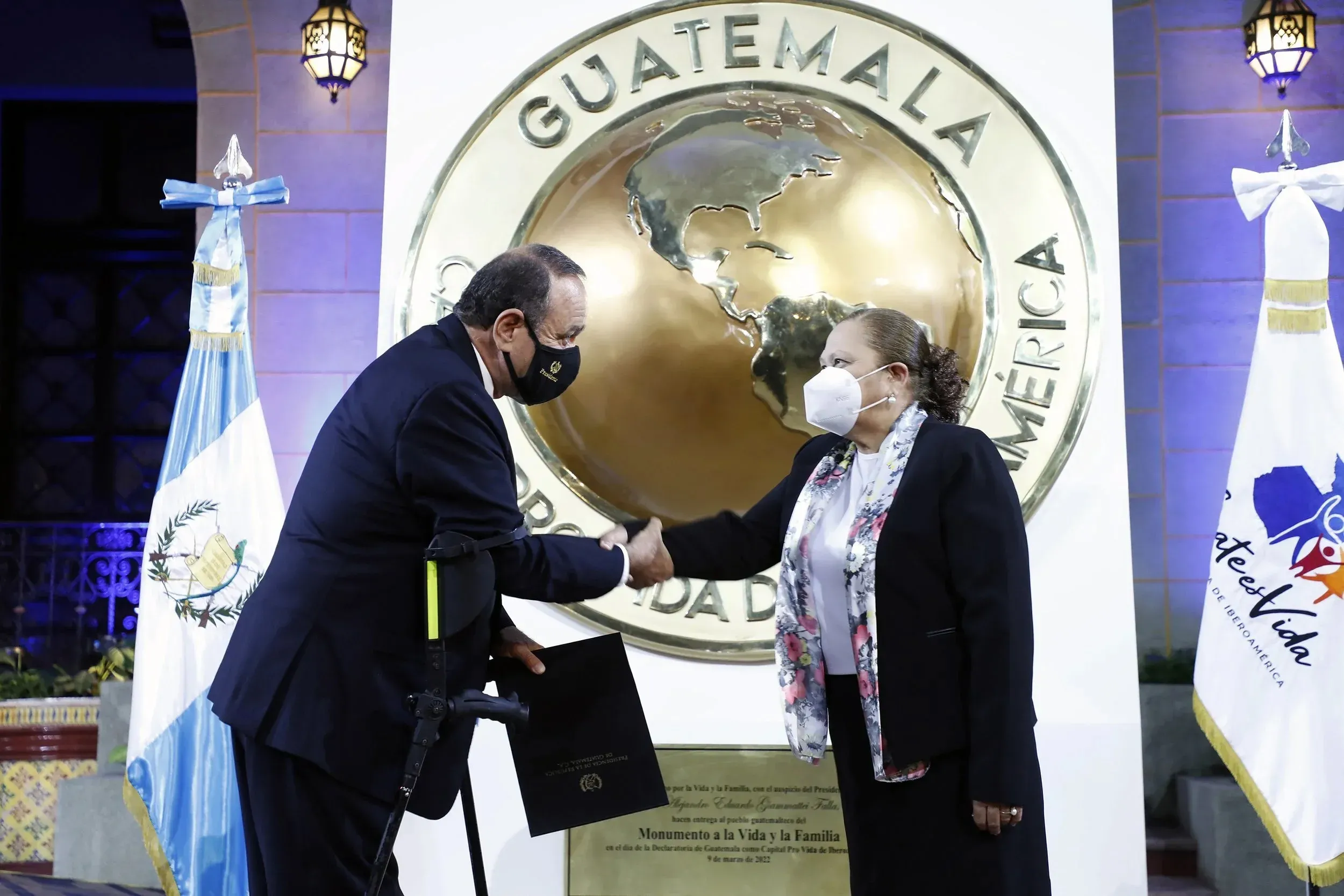
Porras is one of several Guatemalan officials whom the U.S. government has targeted for visa denial over alleged corruption.
Porras and her conservative followers have followed a game plan to provoke the Arévalo administration. A recent action was to order the detention of the Indigenous leader and Vice Minister of Sustainable Development at the Department of Mines, Luis Pacheco. Pacheco is a former leader of the 28 Cantones de Totonicapán, an influential Indigenous group that organized demonstrations against Porras when Arévalo won the presidential elections in 2023.
The shifting political winds in Guatemala have effectively stopped the work of justice advocates and international prosecutors who had been investigating war crimes and human rights violations. Between 2007 to 2019, Guatemala seemed destined for a more robust democracy. Concern had grown among Guatemalan business and political groups about a weak rule of law. Sure, peace accords had ended the civil war in 1996, but average Guatemalans came to realize the new peace had not curbed organized crime, which had flourished during the war, with the help of some military and police officers.
Forces linked to retired Guatemalan military officials are thought to have participated in the 1998 murder of Archbishop Juan José Gerardi following the Catholic Church’s publication of a scathing human rights report that he presented linking the military to political assassinations during the civil war. Additionally, the murder of three members of the Central American parliament in February 2007 by forces linked to Guatemalan police officers and organized crime rattled the Guatemalan middle class.
A model for peace and reconciliation
Then came the CICIG, which received financial help from the U.S. and European governments and the philanthropic group Open Society. The organization and the justice campaign had support in Washington, even among Republican lawmakers. It quickly moved to strengthen Guatemala’s judicial institutions. Initially, UN staffers were brought in to run the organization. But soon, Guatemala’s brightest and youngest legal talent was recruited, and the new teams overhauled government investigative practices, introducing prosecutorial tools such as plea bargaining and asset forfeiture.
The commission won Guatemalans' trust, according to a former prosecutor who is now living in exile in the U.S. (palabra is withholding the former prosecutor’s name out of concerns for their safety.) By 2019, CICIG had prosecuted more than 1,500 suspects, including up to 200 government officials, according to the advocacy group Washington Office on Latin America.
But the legal victories were costly: prosecutions earned CICIG enemies who turned their political clout against CICIG prosecutors and Guatemalan supporters.
Cozying up to Trump
The Guatemalan right wing made inroads against the CICIG when they cozied up to Trump during his first administration. CICIG’s most significant victory against corruption started in 2015 with the arrest of former President Otto Pérez Molina and Vice President Roxana Baldetti for involvement in a multi-million dollar customs fraud scheme known as “La Línea” – The Line.
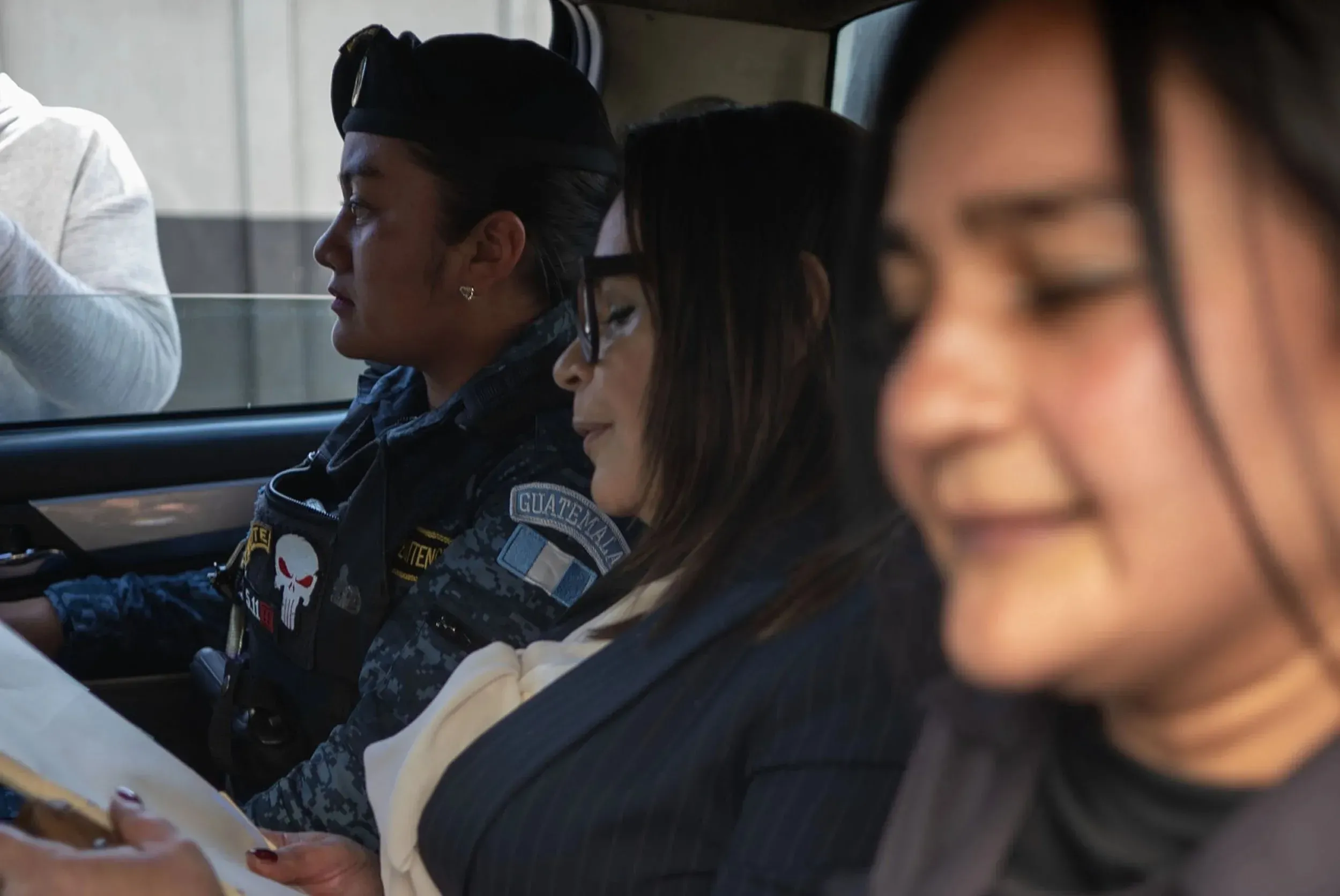
The case led to demonstrations and inspired young Guatemalans to celebrate with street rallies. But not everyone was celebrating. Retired military officers, including some under investigation for human rights violations during the civil strife, had grown concerned about Pérez Molina’s arrest because he was a former top military officer. They then launched a new right-wing party, the Frente de Convergencia Nacional (National Convergence Front). Next, they reached out to Guatemala’s leading business group, CACIF, which had also been targeted by CICIG prosecutors. The Convergence Front had received a secret $1 million campaign contribution from the pro-business group, and then rallied behind the underdog Jimmy Morales’ successful leap from comedian and novice politician to the presidency.
CICIG discovered the business group’s illegal campaign contributions not long after Morales’ victory, and prepared to investigate the new president. CICIG director Iván Velásquez asked the Guatemalan Congress to remove Morales’ presidential immunity from prosecution – a request that would start the CICIG on a path toward dissolution.
In a few months, Velásquez was banned from Guatemala, and Morales became the darling of Guatemala’s right wing. “Velásquez failed to understand the forces that had been building against CICIG,” according to a former U.S. diplomat with close ties to Guatemala.
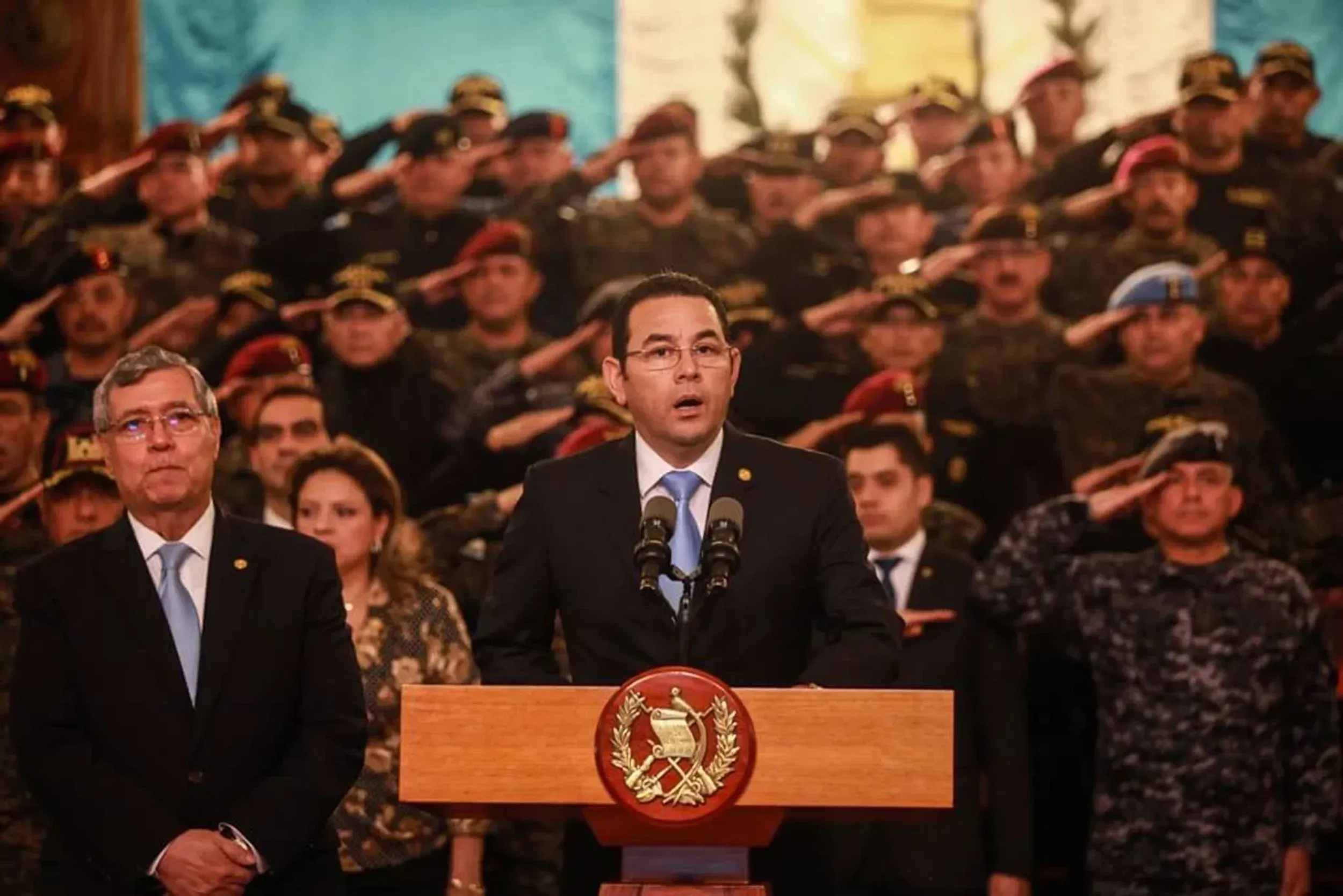
God and the D.C. endgame
Closing the CICIG offices went from a dream to reality after the Guatemalan business leaders hired powerful lobbying firms in Washington. Chief among them was the firm Greenberg Tauring, LLC, which was tightly allied with the first Trump administration. But in the end, it was through religion that Guatemala finally crushed CICIG.
In Guatemala today, some 80 percent of evangelical Christians are said to be Pentecostal, a mixture of both classical and neo-Pentecostals, a branch of evangelical Christianity. The country largely turned away from Catholicism during the civil war due to the Catholic Church’s support of liberation theology, which had been closely linked to leftist movements in Central America. Indigenous communities outside Guatemala City embraced Pentecostalism as they believed it offered protection from military persecution. To the Guatemalan military, the Catholic Church was suspect, as officers believed priests espousing liberation theology had supported the guerrillas.
To chart the new anti-CICIG campaign, Morales and his military advisers selected Manuel Espina as ambassador to the U.S. Espina was the son of Guatemala’s former Vice President Gustavo Adolfo Espina, who in 1993 accompanied President Jorge Serrano as he tried to take absolute power of the government by dissolving Congress. The plan failed, and Espina and his family were exiled for a few years.
But years later, Manuel Espina became a successful Pentecostal activist who worked with religious U.S. leaders in building an influential religious chapter in Guatemala City called Guatemala Próspera. Many U.S. Congress members were among his religious mentors, and he often led church trips from the U.S. to Guatemala.
His U.S. friends invited him to religious events, most notably the National Prayer Breakfast, which is held every February in Washington, D.C., and has traditionally attracted presidents, members of Congress, and foreign dignitaries. Espina was also aligned with the Pentecostal Christian sect known as The Family, which managed the breakfast event until 2023.
Espina had curried favor among influential U.S. politicians, including former Alabama Senator Jeff Sessions, who joined his Guatemalan group’s board of directors. According to Jonathan Larsen, a journalist and former editor of TYT Investigates, Espina had established a good network in Washington, D.C., even before he arrived as Guatemala’s ambassador.
The Russian controversy
In Guatemala, Morales' government was powered by military advisers who had begun calling themselves the Sanhedrin, after the supreme Jewish judicial and administrative body in ancient Israel. Guatemala has always had a close relationship with Israel, and Morales’ Sanhedrin friends encouraged strengthening ties with the Jewish state. This became important when Trump announced his controversial decision to move the U.S. embassy in Israel from Tel Aviv to Jerusalem. Morales was the first foreign leader to follow suit.
In the summer of 2017, President Morales visited Washington for talks with the Trump administration. Guatemala’s lobbyists, Greenberg Taurig, introduced him to important Jewish American donors, and the World Jewish Congress gave him top honors.
But Morales was not done. In Guatemala City, his military advisers launched a campaign they called “Wag the Dog,” like the Robert De Niro and Dustin Hoffman movie about spin doctors and war. The campaign was aimed at attracting more Washington politicians into the anti-CICIG camp. A selling point was found: One CICIG investigation involved a Russian family who had come to Guatemala illegally and bought fake Guatemalan residency documents from a criminal group.
Timber and paper magnate Igor Bitkov, his wife Irina, and their two children had moved to Guatemala in 2008 after they ran afoul of Russian President Vladimir Putin. But a year later, a Guatemalan court convicted the family of using fake documents, and the case drew the ire of conservatives in the United States, who recruited U.S.-born naturalized British citizen William Browder, a financier and human rights activist who had fled Russia after challenging Putin-aligned oligarchs, to help the Bitkovs. Browder told the New York Times that the Russian government had pushed the CICIG to pursue the Bitkovs in the Guatemalan passport scandal. Browder, in turn, reached out to U.S. lawmakers, and soon, conservative Republican senators were writing anti-CICIG letters.
The lobbying resulted in then-Senator Rubio moving to freeze $6 million in U.S. aid to the CICIG and to promote a hearing at the Geneva-based International Criminal Court.
The Bitkov case coincided with Ambassador Espina’s forging connections to the first Trump administration. Through new friends like Sessions, conservative Republicans welcomed Espina into The Family, which, beyond evangelicalism, is a closed, political, and religious organization that has long sought influence among politicians.
The Family first organized the National Prayer Breakfast in 1953, and has since brought together U.S. politicians and foreign dignitaries, some whose questionable backgrounds were less important than staunch anti-communist credentials. And in 2018, a Russian operative who was trying to organize a back channel of communication with American politicians was indicted by a federal grand jury after attending the breakfast. The episodes dampened the standing of The Family’s prayer session.
In 2024, a new organization, the National Prayer Breakfast Foundation, took over planning the breakfast after 30 groups signed a document criticizing the event. But The Family continued to host its own event elsewhere in Washington. President Biden skipped the gatherings in 2024, but Trump attended both events this year.
‘Espina was moving in and out of important political circles.’
Espina brought other Guatemalan hardliners to meetings with politicians. “Espina was moving in and out of important political circles,” according to a Washington insider with extensive knowledge of Guatemalan politics. The ambassador also organized several trips to Guatemala for U.S. legislators, where they met with business leaders who’d helped Morales win his presidency.
Espina did not respond to palabra’s requests for comment.
In an interview, Tim Rieser, a one-time senior foreign policy aide to former Vermont Democratic Senator Patrick Leahy, described Espina as a congressional charmer. Another congressional aide said, “Some members of Congress are not savvy about who they are dealing with, and they can quickly be taken in and manipulated.”
New president; new game plan
Morales was a controversial president. But he was subdued compared to Alejandro Giammattei, a former mid-level government official with a history of corruption who became president in 2020. He soon was working in tandem with Attorney General Porras. Giammattei and Porras attacked former prosecutors, lawyers, and journalists. Up to 200 legal experts who had worked with CICIG had to leave the country because of threats and persecution.
So began the period known as the Pacto de Corruptos – the Pact of the Corrupt – when politicians teamed with business leaders and former military officers to reverse reforms the CICIG had authored.
The cabal’s highest-profile target was Guatemala’s premier daily newspaper, El Periódico, and its award-winning publisher, José Rubén Zamora, who had chronicled the rise of the secretive pro-military organization, La Línea.
During the civil war, the military had taken control of customs and ports, allegedly to identify and stop the flow of weapons “coming into Guatemala for the Guatemalan guerrillas,” Zamora wrote, adding that it proved to be a multi-million dollar illegal scheme that enriched the military ranks during and after the war.
Zamora’s influential news outlet counted on savvy writers and cartoonists who lampooned the powerful and, with tips from friendly politicians, had faced down several presidents and called out organized crime groups, retired military chiefs, business leaders, and members of the Guatemalan Congress.
During Giammattei’s presidency, El Periódico often wrote about Miguel Martínez, a young government official who wielded incredible political influence during the Giammattei period and was suspected of rampant corruption and organizing government shakedowns. One column nicknamed Giammattei and his friend “the Ogre and the Little Prince.” Another went so far as to suggest a personal relationship between Giammattei and Martínez. A few days after the column appeared, a large contingent of masked police raided Zamora’s home and arrested him, accusing the publisher of money laundering.
Zamora has faced incredible legal setbacks in almost three years behind bars. His lawyers were accused of conspiracy, leaving him to navigate his case without legal representation for some time. In the fall of 2024, a judge ordered Zamora’s transfer to house detention until the case was resolved, a ruling that was rescinded this spring.
President Arévalo has tried to intervene in Zamora’s case, but has been stymied by Attorney General Porras.
“We are very troubled by what’s happening in José Rubén Zamora’s case, because what we are seeing here is a total breakdown of the rule of law in Guatemala,” said Caoilfhionn Gallagher, who leads Zamora’s international legal team.
Zamora’s case has shone another spotlight on justice and free speech in Guatemala, even as the nation’s stature has risen within the U.S. State Department under Rubio and the Trump White House. President Arévalo has redoubled efforts he began during the Biden years. Only now, his offer to Trump’s team is to accept 40 percent more deportation flights with undocumented migrants from many nations, potentially bringing to Guatemala some 100,000 new deportees every year. In 2023, more than 50,000 repatriated Guatemalans returned to the country.
But even as the Arévalo administration prepares to offer social programs to help deported Guatemalans, the country’s economic outlook is grim. Guatemala’s economy depends on remittances sent by immigrants in the U.S. In 2024, the money was equivalent to 20 percent of the country’s GDP, according to the World Bank. Absorbing thousands more deportees may pose yet another challenge to Arévalo’s delicate geopolitical balancing act.
Edited by Ricardo Sandoval-Palos.








